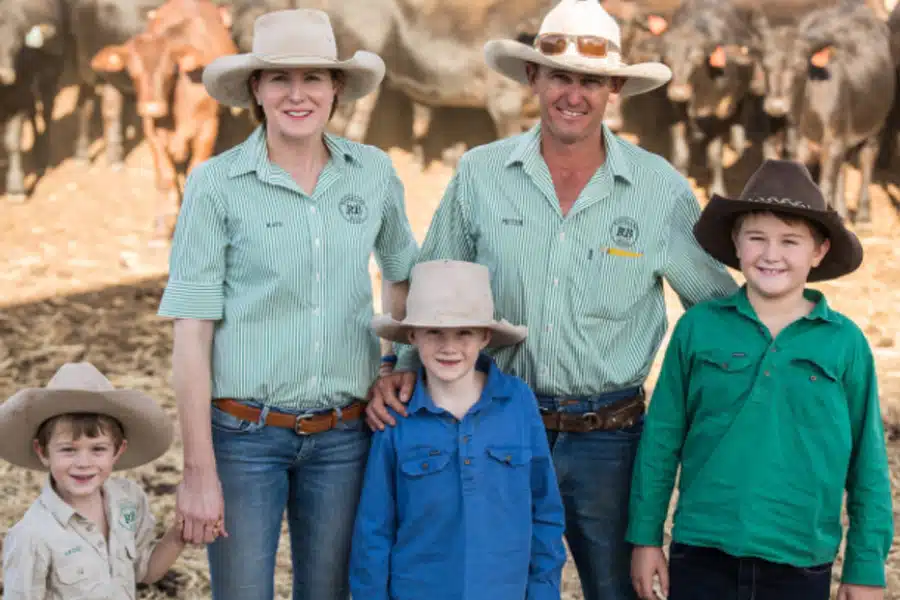What would you like people to know about being a beef producer?
The health of our environment and animals is pivotal to the sustainability of our business. Producing a highly nutritious, sustainable protein source is a very rewarding occupation.
How do you manage isolation?
I guess it depends on who you speak with as to whether they consider themselves isolated – we actually don’t consider ourselves isolated! Our days are full and when your days are spent doing what you love and what you feel passionate about your work is very satisfying. Of course we need to make provision for supplies. We have a twice weekly mail service and (prior to COVID – 19) delivered to our front door. I can have an organic fruit and veg order, ordered from Toowoomba and delivered to my door step overnight!
I think the most challenging aspect of where we live is educating our children.
We live in a wonderful, very social community.
Why is organic agriculture important to you?
Our breeding philosophy and management practices are very much aligned to producing organically – breeding cattle that are naturally resilient to internal and external parasites and adapted to the environment without a reliance on inputs.
Have you done any animal welfare, environmental or social sustainability work you’d like consumers to know about?
We are GAP certified – which is a globally recognised animal welfare code. You wouldn’t be a cattle producer if you weren’t an animal lover and do all you can to reduce any stresses and maximise their wellbeing. For us, producing animals with as little stress as possible and working with nature to maximise our production such as having breeders lactating at the optimum time of our season is central to our program. We also adhere to Low Stress Stockhandling principles. We are committed to raising animals in the most sustainable environment we can have with the least stress as practicable.
What is your property name, location, size, history?
Wetlands, 74kms NE Augathella 34,000 acres. My family property that was subdivided in 2008, as part of my family’s succession plan. Pete and I purchased the southern portion and my sister and her husband purchased the northern portion of property and renamed it ‘Belclare’. My parents moved to another property, ‘Moriah’, which they own at Chinchilla.
Pete and I purchased another property, Glenba 12 km north of Morven, in May 2017
What does a typical day look like for you?
I don’t think we really have a typical day! Every day is different and depends on the work program relevant at that time of year. I think rural people are very good at being flexible and the ability to improvise. You can set out with your work program in the morning or that week and then can change in an instant if you come across a water problem, stock out/fences down, break downs, trucking times. Different jobs are undertaken at different times of the year. For example, we have just completed our weaning and preg-testing program.
We are still catching up with fencing from the magnificent rain earlier in the year and we will start measuring our weaner bulls as soon as we can. We then spend a lot of time on maintenance during the cooler months, ie. grading roads, fire breaks, fire mitigation and moving cows in preparation for calving Aug – Oct. September is when we hold our annual on farm bull sale which involves some preparation for the day, data recording and bull testing prior to the day. November is when we brand and the first few months of the year – (seasons permitting) we spend rotating cattle, weighing and marketing.
What are you favourite beef recipes?
During the summer-time, steak and salad would be our go-to meal. During the cooler months we love nothing more than a hearty stew with crusty bread, soup or curry.
Do you have any food storage tips or practices?
Be aware of what’s in the pantry and not let things expire. Love to double bake quantities and have a little stockpile in the freezer.
Do you have any tips on reducing food waste?
Attempt to meal plan to ensure I order correct quantities of ingredients and use all leftovers. If I have extra of some fresh ingredients, I look for recipes to utilise them. When food is wasted or not of good quality and is thrown out or given to the chooks that’s when grocery bills can become expensive! This is something we feel very strongly about – minimising food waste.
What do you like about OBE Organic®.
I love the history behind the company. Its transparency, helpfulness and genuineness of staff. The feedback provided on cattle is timely and very relevant.









